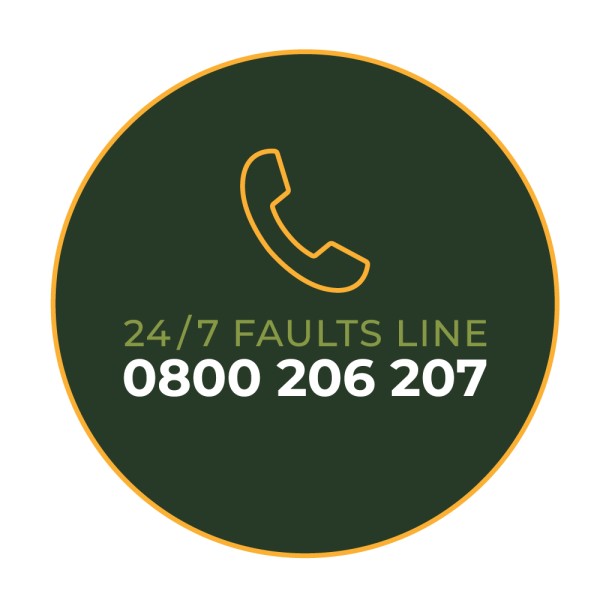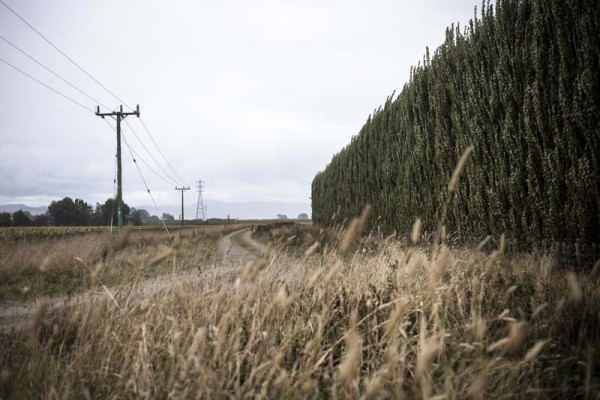
Protect yourself near power lines
- Treat ALL power lines as live at ALL times.
- Stay away from power boxes, substations and electrical worksites.
- Never climb, jump, or sit on a power box.
- Don’t kick or poke anything inside a power box.
- Don’t throw things into power lines.
- Stay away from fallen power lines – they could still shock you.
- Trees growing into power lines can also cause electrical shock.
- Check for power lines before climbing any tree.
- Report all low hanging wires.
- Report any unsecured power boxes/panel covers/lids.
Working Outdoors near live power cables? Remember, look up, look out, work smart!
Whether you're digging, fencing, or trimming trees make sure its safe to proceed by:
Plan ahead.
Stay alert.
Always identify overhead lines—and check what's below before you dig.
Before starting any excavation or site work and for advice or cable relocation help, contact Firstlight Network to make sure it’s safe to proceed.
0800 206 207 and remember to look up, look out, work smart.
Call nowSafety legislation and guides
Electricity Act 1992
Electricity (Safety) Regulations 2010
Electricity (Hazards from Trees) Regulations 2003
NZECP 34:2001 NZ Code of Practice for Electrical Safe Distances
NZECP 50:2004 NZ Electrical Code of Practice for Repair and Maintenance of Domestic Electrical Appliances by the Owner of the Appliance
NZECP 51:2004 NZ Electrical Code of Practice for Homeowner/Occupier’s Electrical Wiring Work in Domestic Installations
Emergency Services Personnel – Guide to Electrical Safety 2009 (EEA)
Underground Cable Safety Guidelines
Fallen lines
Never approach fallen power lines. For your safety make sure you stay at least 10 metres away. If you see fallen lines, call us immediately on 0800 206 207.
If a line falls on a vehicle don’t touch the vehicle as it could still be ‘live’. If you’re in the vehicle it’s best to stay inside until we, or the emergency services, advise that it’s safe to get out. If you have to get out of the vehicle then you need to jump as far away as possible, keeping both feet together. Never touch both the ground and the vehicle at the same time.
Underground cables
Underground cables can be dangerous. Before digging you must check for buried power cables as there are lots of these under most roads and private properties. Request asset location information.
For more information see New Zealand Utilities Advisory Group’s ‘Guide for Safety with Underground Services’.
Overhead lines
Always treat all lines as if they are live. If you’re working near overhead lines you must make sure there’s always at least four metres clearance for any scaffolding or machinery. Remember high voltage electricity can jump. Don’t chance it – you don’t even need to touch the line to be injured or killed.
Call us first and get the right advice before planning any building project or starting excavation work near overhead lines.

Farmers
Metal irrigation pipes close to power lines cause accidents. On the farm, take care when loading or unloading piping and keep all irrigation equipment at least four metres from overhead power lines. Pay attention to overhead power lines and be careful when you’re working on vehicles with raised apparatus, such as drills, grain augers and ladders.
When replacing or planning new fences don’t follow the same path as overhead power lines. If a fence wire breaks, it could flick upwards and come into contact with an overhead power line.
When working with any power tools, use a Residual Current Device (RCD), which will shut off the electricity supply in the event of a dangerous situation or accident.
Using portable generators safely
Portable generators are designed to be moved around – when you’re going camping, for example. They’re not intended for general household electricity supply.
They are only for temporary power supply to a few appliances at a time through flexible cords.
- Never add fuel to your generator while it’s running
- Add appliances progressively one by one, starting with the largest.
- Never add appliances all at once or connect loads that exceed your generator’s maximum output rating e.g. 2000 watts (2 kilowatts).
- Don’t attempt to connect your generator to the supply through a wall outlet or by altering your house wiring.
- Never use a generator inside a building. This could create the possibility of carbon monoxide poisoning or fire.
- For additional safety, use a safety switch designed especially for generators.
- Always use a multiple-outlet box with built in load limiters. Don’t piggy-back cords on one outlet, as this is known to cause fires.
Home owners
The government codes of practice set out the guidelines for DIYers who want to carry out electrical work themselves in their home. These standards are produced by the Energy Safety Service and Ministry of Economic Development, and are available here.
Electromagnetic Fields (EMF)
Electric and magnetic fields are produced by any wiring or equipment carrying electric current. Common sources of electromagnetic fields include overhead and underground power lines, household electrical wiring and electrical equipment, for example.
Firstlight Network is committed to managing issues relating to electromagnetic fields by:
- Utilising evidence-based information to support operational decisions
- Complying with the regulated requirements of relevant independent authorities
- Providing advice to interested parties
There have been many studies carried out over the past 30 years, and there is still no persuasive evidence to show that electromagnetic fields pose any health risk. Nor has any mechanism been established through which such exposures could cause a health risk. For detailed information, please see the Ministry of Health guide here.
